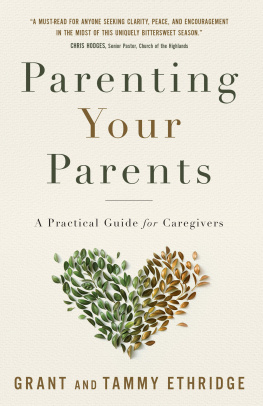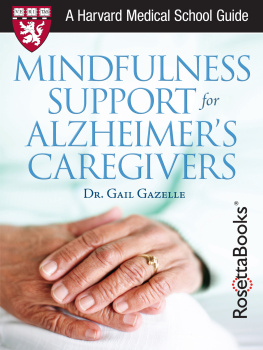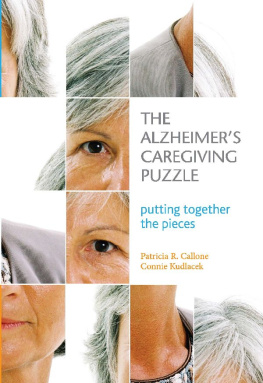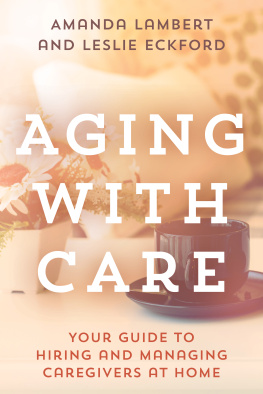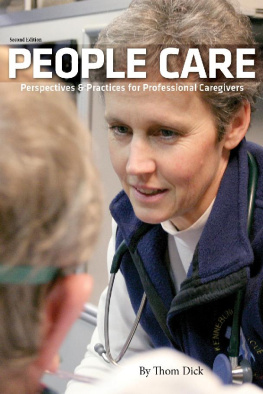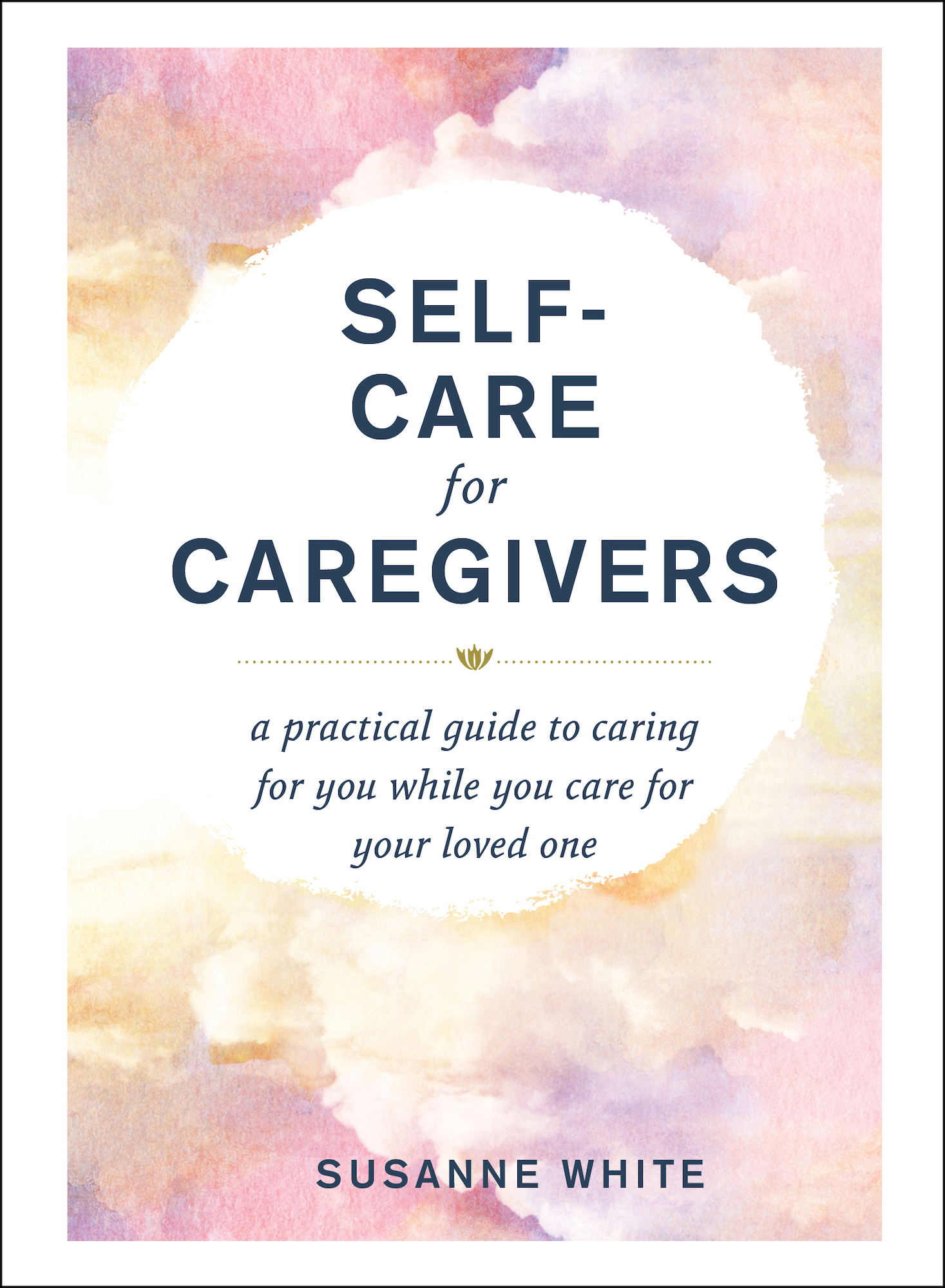CONTENTS
Guide
Self-Care for Caregivers
A Practical Guide to Caring for You While You Care for Your Loved One
Susanne White
DEDICATION
For Mama Claire and Pop Pop.
Without you, there would be no Caregiver Warrior.
I miss you every day.
INTRODUCTION
Being a caregiver is an important and meaningful responsibility, but it can also be exhausting. It is vital that you consider your own needs and remain resilient, positive, and strong.
As a caregiver, you are asked to do your best to take care of your loved one no matter what challenges come your way. You are called to leave yourself at the door and prepare to put your loved ones needs firstwhich you happily and selflessly do. But you probably also tend to abandon your own self-care needs as you attentively focus on the well-being of your loved one. Its time to start making yourself a priority.
Thats where Self-Care for Caregivers comes in. This book explains what it means to put yourself first, why it is so important, and practical ways to make it happen. Filled with more than one hundred activities and simple suggestions to help you rejuvenate and recharge, this book will put you on the path to being centered, focused, and healthy in body, mind, and spirit.
Inside, youll learn how to achieve a new perspective through activities like:
- Taking your emotional temperature daily to understand and manage the big feelings caregiving can trigger.
- Creating a tribe you can count on to listen, lend a hand, and stop you from feeling lonely and stressed.
- Learning to ask for help without feeling guilty or ashamed.
- Creating boundaries so you can preserve your energy for yourself and your loved ones.
- Improving your communication skills so everyone involved is clear about whats happening.
- Learning to be kind to yourself because self-love is the foundation of empowered caregiving.
In these pages, you will find the help you need to appreciate and care for yourself as you care for others. You will be guided along your caregiving path with hope and strength while facing the challenging role of caregiving, because when you are rested, healthy, and fulfilled you not only feel whole and nurtured; you also have more to give to others. So take some time for yourself and turn the page to experience rejuvenating self-care!
C aregiving can be an emotional roller coaster ride, bringing big, surprising, and sometimes debilitating feelings to the surface. Every caregiver is unique, and the emotional reactions you will experience are as individual as you are, but all caregivers have one thing in common: You will be affected emotionally in ways that will change your life forever.
Emotional self-care is vital to staying ahead of the emotional curveballs caregiving can throw into your life. Knowing how to manage the emotional toll of caregiving and its aftermath is critical to being your healthiest and best self. In this chapter, you will find simple yet powerful activities and actions you can take to insulate, protect, and heal yourself from the big emotions caregiving can bring about. These activities will inspire you to prioritize your self-care and to remember that your feelings and emotions matter and that you are entitled to having them, understanding them, sitting with them, and coming up with the best possible way to manage them for the healthiest and most effective outcome.
Your emotions are your guidelines. They are important indicators of how caregiving is affecting you and how you need to move forward to stay balanced and flourish. This chapter will give you tools for emotional awareness and stability that every caregiver needs to thrive.
Take Your Emotional Temperature
As a caregiver, it is critical that you stop for a moment and check in with your feelings. What are you feeling right now? Are you frustrated, angry, scared, worried? You so generously worry about the feelings of others, now is the time for you to acknowledge your own.
By taking an emotional time-out to check in with your feelings, you have a chance to experience them instead of letting them build up. You cant make your feelings disappear, but by being aware of them, they lose their power, giving you a chance to feel them and then let them go. The only way to get over feelings is to go through them.
Sit still and feel whats going on. Tell yourself its okay to feel whatever it is you are feeling. Anger, frustration, fear, and guilt are common and normal reactions during the caregiving journey. Give yourself permission to feel these emotions. Caregiving can be hard and upsetting. Tell yourself that, while it may feel uncomfortable right now, you are going to feel your painful emotions instead of stuffing them down inside. Remember that there is nothing wrong with feeling angry or afraid or sad. Should you feel consumed with the emotions you are feeling and they seem overwhelming, it may be time to seek help from your doctor or therapist. There is no reason to be ashamed or afraid to reach out to others when big feelings are triggered. You are not alone.
Let Mistakes Be Teachers
Mistakes are good things if you use them as teachers and learn from them. It is not always easy to take this positive, mature, and balanced view, especially during the caregiving journey, when the stakes feel so high and consequences feel larger than life.
Yet, we are human, and we all make mistakes. Caregiving is one of the most likely fields for mistakes to happen because the territory is often unexpected and unknown. You can rarely handle everything you confront without a stumble here and there. Try these tools when you make a mistake:
- Frame the mistake this way: You have learned something. Youll never do that thing that way ever again. You now know better. Accept the responsibility for the mistake so you can make it your friend.
- Ask yourself: What happened, why did it happen, whats my part, what went wrong, what was learned about the situation and myself? Write down the answers.
- Look over your answers and see if there is anything you can do right now to prevent the same type of situation from happening again.
- Write down any actions you can take to give you an edge when a similar situation arises.
- Forgive yourself. Remember, you are serving others; you have the best intentions, and you are a good person. Now you are smarter. Dont wallow; instead, wonder and be thankful for the wisdom.
Embrace Your New Life Even When You Resent the Loss of Your Old One
Any way you look at it, once you step into the caregiver role, your life is changed forever. You are now completely focused on the needs of others, committed to doing everything you can to ensure that those you care for are safe, comfortable, and pain-free. You are prioritizing their lives, and to do that you need to make concessions with yours.
This can be frustrating and upsetting when you feel that your life as you knew it is gone and things seem so different. It may seem as though you have permanently lost your old life in exchange for a new one. You can become resentful as time passes and you begin to miss the things you used to do and the time and energy you had to do them. Its hard to ease the pain and frustration you feel when you cant be as free and self-concerned as you are used to being. You most certainly are entitled to be a little grouchy and sad about the changes in your life. You are mourning what feels like the loss of your identity and lifestyle. You may even feel lost.


